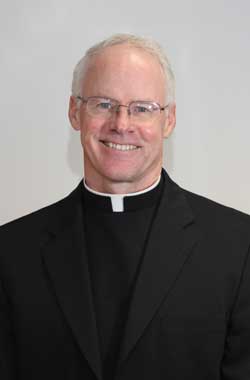Tom: Mom, your car is blocking mine and I need to get to work.
Pop: “Mea culpa,” Tom. I parked it there.
Tom: “Mea” what?
Pop: “Mea culpa.” That’s Latin for “my fault.” Been ingrained in my mind from my days as an altar boy.
Patty: Wow! I can barely remember the Mass in Latin. Why did we change to English?

The Bridges, a column about the fictional Bridges family, is written by Father John J. Ames, deputy secretary for the Office for Catechetical Formation for the Archdiocese of Philadelphia.
I remember joining with my sisters in planning our parents’ 50th wedding anniversary. It was a great time. I had the privilege of celebrating the anniversary Mass and delivering the homily. The reception was elegant. The restaurant … beautifully decorated. The food … delicious. Music played.
The room was illuminated with the faces of relatives and friends who had a part in my parents’ journey of life. Stories were shared, moments were re-lived. Toasts were offered for the 50 past years, and others were offered for 50 more. That day was a magnificent blessing from God.
Oct. 11, 2012 marked the 50th anniversary of the opening of the Second Vatican Council. (Do you know how many Ecumenical Councils have been held?) Bishops from all over the world met in Vatican City for three different sessions which concluded on Dec. 8, 1965.
To commemorate the Council, Pope Benedict has proclaimed a “Year of Faith” (Oct. 11, 2012 to Nov. 24, 2013). Anniversaries invite reflection on the past and hope for the future. That, in fact, was what the Second Vatican Council itself sought to do. The Council undertook to make the Church a more authentic witness in the world by searching back and seeking forward.
Anyone who has ever painted knows that over time the layers can become quite thick. Eventually, the paint needs to be sanded and buffed to recover the original luster of the surface. Similarly, Jesus and his teachings are the foundation of the Church. The Church is the instrument for communicating Jesus and his teachings to the world.
By 1962, nearly 2000 years had passed since Jesus actually walked the earth. The Bishops saw the need to recover the original beauty and luster of his person and teachings. They wanted to make sure that layers of time had not dimmed the light of his truth.
“Resourcement” is a term that means, “return to the sources.”
[hotblock]
By returning to the source, to Jesus, we discover more clearly our identity as his disciples and as a Church. The Council Fathers encouraged returning to the Sacred Scriptures and the writings of early Church fathers. Rooting Church teaching more clearly in these texts assures that Jesus’ teachings remain as clear, vibrant and meaningful today as they were originally.
The Council also encouraged the Church to look forward. For more than 400 years, the Catholic Church had been somewhat defensive in response to the Protestant Reformation. Popes and bishops understandably sought to protect Catholics from error, confusion and heresy. As a result, the Church had, in some ways, closed itself off to the secular world. Invisible walls were erected that hindered dialogue between the Church and those outside the Church.
“Aggiornamento” means “Bringing up to date.” It refers to a spirit of change and open-mindedness. Pope John XXIII, who convoked the Second Vatican Council, wanted the Church to interact with the culture and uncover for the world how God is present everywhere. He invited more open dialogue with those who did not consider themselves to be Catholic. He desired to update the Church and its teachings so that it would be more effective in presenting Jesus to the world.
Most people, like Patty Bridges, do not remember when Mass was celebrated in Latin. Many older people may be surprised to learn the Mass was not originally celebrated in Latin. As a result of Vatican Council II, changes were made in the Mass and many other areas of Church life.
Hopefully, these changes, guided by the Holy Spirit, help the Church grow more and more to be the people of God. The “Year of Faith” is a terrific opportunity for all of us to learn more about this Ecumenical Council (there have been 21) and the impact it has had on the Church.
PREVIOUS: The problem of joy
NEXT: She’s had enough of election flyers; he wants to debate the candidates



Share this story